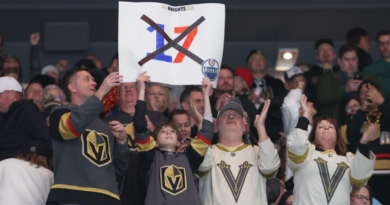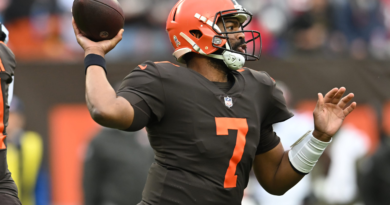The overlooked deal that can keep the Timberwolves among the West's elite
The most consequential long-term development of NBA All-Star Weekend came on Monday after everyone had left Indianapolis, when ESPN’s Adrian Wojnarowski reported that the Minnesota Timberwolves had agreed on a two-year, $21 million contract extension with point guard Mike Conley.
The Timberwolves’ exciting rise to the top of the Western Conference came with a long-term concern: Could Minnesota afford to keep this core together?
With extensions for Anthony Edwards, Jaden McDaniels and Karl-Anthony Towns all kicking in next season and raising their salaries, the Timberwolves’ payroll stands to escalate dramatically after ranking 11th in the NBA this season.
Because Minnesota projects near the NBA’s second luxury tax apron with Conley, navigating the tax and the restrictions on high-spending teams in the new collective bargaining agreement (CBA) remains a concern. Nonetheless, getting a veteran leader under contract for a salary less than other teams could have offered by using the non-taxpayer midlevel exception is a huge win for Minnesota.
Conley’s potential to become an unrestricted free agent was one of the biggest variables for the Timberwolves. Now, Minnesota can realistically hope to keep the group that has fit together so well this season for another run in 2024-25.
Projecting the Timberwolves’ payroll
With both Edwards and Towns signing extensions that pay those two All-Stars a percentage of the 2024-25 salary cap, we don’t yet know Minnesota’s exact salary figures. Based on the current projection of a $141 million cap, Towns’ contract will start at $49.35 million (35% of the cap) and Edwards at $35.25 million (25%).
Including Conley’s extension, that would give the Timberwolves $184.2 million in guaranteed salary for 2024-25 with just nine players under contract, a figure that’s already approaching the projected second apron of $190 million.
There’s still one crucial wild card for Minnesota: whether Edwards makes All-NBA, in which case he’d qualify to increase his starting salary to 30% of the cap ($42.3 million). In that scenario, the Timberwolves would exceed the second apron before even filling out their roster.
To some extent, the new restrictions may not affect Minnesota as much as other teams. With their starting five under contract, the Timberwolves won’t necessarily look to aggregate salaries via trade and aren’t a frequent destination for buyout candidates.
In an older arena in a midsize market, the bigger issue for Minnesota will likely be the tax itself. Let’s say that Edwards misses All-NBA and the Timberwolves keep their first-round pick before filling out the roster with minimum-salary players in place of their current free agents. In that case, Minnesota would be looking at a projected tax bill of about $60 million. Any additional salary would increase that at a rate of 3.25 times the salary.
The Timberwolves have paid the tax just once since 2006-07. In 2019-20, when Minnesota was unable to reach a buyout after adding payroll by dealing for D’Angelo Russell at the deadline, the team ended up paying about $500,000 in tax. The Timberwolves last paid more than $1 million in 2003-04 — the only time in franchise history they’ve won a playoff series.
The counterpoint to Minnesota’s tax history is that no Timberwolves team since that season has merited paying the tax until now. Minnesota will also likely have new ownership next season with Marc Lore and Alex Rodriguez scheduled to complete their purchase of a controlling share from longtime owner Glen Taylor. Lore and Rodriguez helped greenlight the July 2022 trade for center Rudy Gobert knowing that it would likely mean paying the tax down the road.
Even though it would increase the size of the extensions for Edwards and Towns, a higher projected salary cap would also offer Minnesota a little more breathing room by decreasing the Timberwolves’ tax payment.
Future decisions for Timberwolves
Getting Conley under contract for 2024-25 was crucial because Minnesota’s other point guards — including newly acquired Monte Morris and third-stringer Jordan McLaughlin — are set to become unrestricted free agents next summer.
Although dealing for Gobert was the biggest (and riskiest) move that set up the Timberwolves to become contenders, they wouldn’t be in this position without Conley. His unselfish, low-risk style of play (his 6.1 assist-to-turnover ratio ranks second among NBA regulars this season) has fit perfectly with Minnesota’s younger cornerstones of Edwards and Towns.
Had Conley looked elsewhere as an unrestricted free agent this summer, the Timberwolves would have had limited ability to replace him from outside the roster. Teams that exceed the second apron are unable to use the taxpayer midlevel exception, meaning Minnesota could offer free agents only the minimum.
Adding Morris at the trade deadline gives the Timberwolves an alternative path. At 28, Morris is eight years younger than Conley, and he’s got experience as a full-time starter in 2021-22 for the Denver Nuggets and 2022-23 with the Washington Wizards. In addition, Minnesota has full Bird rights to re-sign Morris. Still, it remains to be seen how well he’ll fit, and the Timberwolves could conceivably bring him back as a backup despite extending Conley.
Minnesota’s other key unrestricted free agent is forward Kyle Anderson, who is eighth on the team in minutes per game. Anderson could be deemed expendable given the cost to re-sign him in terms of luxury tax, particularly if the Timberwolves believe 2023 second-round pick Leonard Miller is ready for a rotation role after playing primarily in the G League as a rookie. (Miller is averaging 22.5 PPG, 10.2 RPG and 3.2 APG during the G League regular season.)
The last player to watch is backup center Naz Reid. If Minnesota needs to shed salary, Reid’s contract would be an option because he plays behind Gobert and Towns. Given Reid could plausibly start for another team at center after averaging 19.6 points and 7.3 rebounds per 36 minutes this season while shooting 42% on 3s, dealing him would also help the Timberwolves replenish their stock of draft picks. Yet Minnesota’s preference would surely be to retain Reid, who is under contract for a reasonable $14 million in 2024-25 before a player option on the final season of his deal.
Had the Timberwolves disappointed again this season after finishing 42-40 in their first year with Gobert — albeit with Towns limited to 29 games — we’d surely be talking about bigger moves, including the potential of trading Towns before his extension kicked in.
Instead, with Minnesota in position to contend for a championship, the goal is to give this group more time together. Conley’s extension makes that hope more likely to come to fruition.




